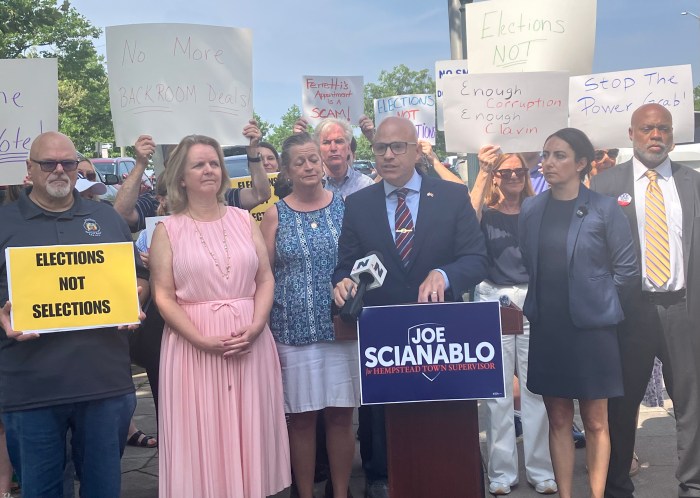The assessed value of a property does not in itself determine the amount of taxes on a property in Nassau County. Assessments only determine an individual property’s share of the taxes imposed by municipalities, school districts or special taxing districts.
That was only one of the messages that Nassau County Assessor Ted Jankowski, appointed by County Executive Suozzi in January of this year, wished to convey at a recent visit to Anton Community Newspapers.
A 30-year veteran of property assessment, with most of that time spent in Massachusetts, Jankowski admitted the situation in Nassau County is more unique than anything he has seen in his assessment career. Assessment appeals are not uncommon anywhere from commercial property owners, but in Nassau County such appeals reach extraordinary high levels among both commercial and residential homeowners.
And that was another message of Jankowski’s presentation. The large number of appeals is costing the county millions of dollars, money that would be better spent, he said, in both improving assessments and defending commercial valuations.
Residential appeals, Jankowski noted, have declined by 16 percent since the 2006-07 tax year and judicial appeals have dropped by 51 percent since the 2006-07 tax year.
Still, the number of appeals is high and the entire process, as Jankowski documented, is mostly an exercise in futility. He noted that in that last tax year, 75 percent of all appeals were rejected. Further, 13 percent of appeals resulted in a 5 percent or less reduction in tax payments, 8 percent resulted in a 6 to 10 percent reduction, 2 percent resulted in an 11 to 15 percent drop, while only 1 percent of all appeals resulted in a 16 percent or more reduction.
Jankowski was highly critical of firms who specialize in inducing homeowners to file appeals, saying they can be very misleading. Also, he said the county, for its part, has made it too easy to file such appeals. Jankowski urged property owners to practice “civic responsibility” and look at their assessment before filing an appeal.
In all, Nassau County is spending $90 million annually for tax refunds—-83 percent of them for commercial properties. Commercial appeals, Jankowski said, are flooding the court system. Plus, the lengthy process of resolving appeals increases the county’s liability, he added.
He said that the assessment administration system in the county is one of the most non-transparent in the country. Laws regulating the assessment system make it difficult for property owners to understand the role of assessments, Jankowski claimed.
Further, the “silo” structure, as Jankowski termed it, between the Department of Assessment, the Assessment Review Commission, and the County’s Attorney’s Office, hinders effective planning and coordination of “scarce” resources.
Assessment Recommendations
Still, Jankowski is not overwhelmed by the system. His office has prepared a series of recommendations to deal with residential and commercial assessments.
That includes developing an outreach program to improve public understanding of the residential assessment process.
Nassau County currently imposes a 6 percent cap on assessment increases, which is New York State law. Jankowski would like to see new state legislation to temporarily suspend that cap for one year in order to allow assessed values to come up to full market value.
On the commercial side, Jankowski would like to create a “tax court” to deal with such appeals, to eliminate “transitional” assessments, to adjust the level of assessment for commercial properties from 1 percent to full market value, and to focus the county’s appraisal resources on valuing the highest assessed properties every year.
Jankowski also wants to streamline and coordinate the entire assessment process.
That includes reorganizing the DOA, performing a technology audit of the DOA, and instituting a case management system to review the methodology for estimating refund liability.
Jankowski would also like the Nassau County District Attorney’s office to closely coordinate its resources with the DOA and Assessment Review Commission to “prepare, manage and defend the current appeal caseload.” He would also like the DA’s office to develop an interdepartmental defense team to track the largest cases that represent the greatest liability, to use in-house appraisers to try cases, and involve the appraiser and assessor in settlement conditions.
Finally, the DOA has now made it possible for homeowners to schedule one-on-one meetings with field assessors.
The purpose of such meetings, Jankowski said, is that if an inaccuracy or incorrect entry is discovered, an adjustment can be made quickly. Homeowners will no longer have to wait months to file an assessment challenge with the Assessment Review Commission from January-March and again wait months for a correction to be made.
Jankowski advised homeowners to first check their property records on the DOA’s website www.mynassauproperty.com to make sure that the information posted is accurate.
































